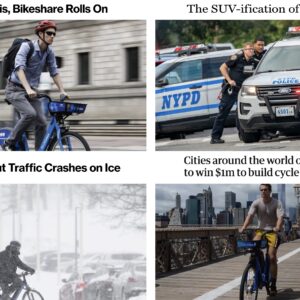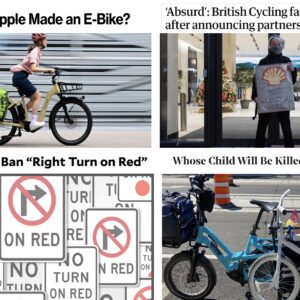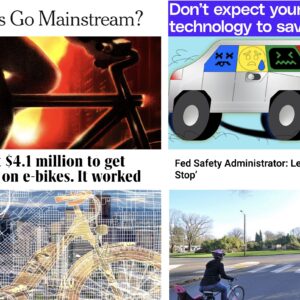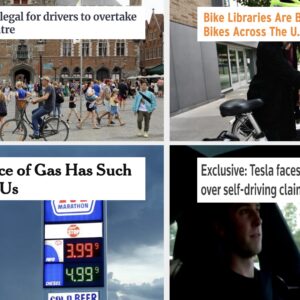– Nationwide, traffic fatalities were at a record low last year, but are still 34,000 too many, according to Sec’y LaHood’s blog. Could a national Vision Zero campaign be in the works?
– In Los Angeles, zoning policies encourage building apartment complexes right next to freeways. But it turns out that this is terrible for residents’ health, particularly causing lung problems for the thousands of children who live a block from a freeway.
– The end of 2010 is slated to see a mass market rollout of electric cars in the Pacific Northwest.
– A low-budget row of jersey barriers carves out space for bikes on a major road—and marks the debut of separated bike lanes in Vancouver, BC.
– In the UK, an elderly, blind woman has to take a 14 mile bus trip to get to the store across the street from her house.
– Reed Bates, a Texas man who was arrested and jailed for riding his bicycle in the center of the road rather than on the shoulder, has been tried and convicted. He’s appealing the case.
– In Idaho, new legislation could require that all bicycles have brakes—stirring up the age-old debate of whether stopping your fixed-gear bike with your legs counts as braking.
– Email dealt quite a blow to the bicycle messenger industry…could carbon credits be bringing it back? Maybe in Paris.
– In Cleveland, advocates have been rallying to get pedestrian and bicycle access added to a new bridge project—and may just get their way.
– The city of San Luis Potosi could become to Mexico what Portland is to the US. The city core is being pedestrianized, and it’s a bike manufacturing hub.
– Sydney, Australia has been dubbed “The City That Hates Bikes.” Some thoughts (and data) here about why that might be.
– LEED certification could soon apply not just to buildings but to entire neighborhoods.
– From San Francisco to Portland…to Louisville! The Car-Free Happy Hour trend is sweeping the nation.
– Finally, listen to what one person thinks are the ten best songs about bicycles and judge for yourself.







Thanks for reading.
BikePortland has served this community with independent community journalism since 2005. We rely on subscriptions from readers like you to survive. Your financial support is vital in keeping this valuable resource alive and well.
Please subscribe today to strengthen and expand our work.
And in Texas, the state school board, recently dropped Thomas Jefferson from a list of key people in the American revolution… reportedly because they aren’t to fond of his ideas about the separation of church and state.
See “Texas Messes with History”
http://www.scientificamerican.com/podcast/episode.cfm?id=texas-messes-with-history-10-03-15&sc=CAT_SP_20100315
Hey, great news on the Dunsmuir/Georgia Viaduct cycletrack.
From Chinatown to downtown, cars whisk along on 60 kmh viaducts, the only part of Vancouver’s planned downtown freeway that got built. They’re about 6 blocks long, but it’s a nice break for drivers from the miles of stop-and-go traffic leading up to them.
Now they’ve given bikes the same favored treatment. The Adanac Bikeway goes for miles from Burnaby to Chinatown, but the Chinatown – downtown connection was always dicey. Now they can just shoot up the entrance ramp to the viaduct and zoom into downtown.
No longer are bikes penalized for their mode choice with slower, more tedious travel routes.
A Portland equivalent might be to extend the new Morrison Bridge Bike Path all the way to Grand Ave.
Nice work, Vancouver, in snapping up an underused car lane to make a good bike facility.
Ted Buehler
(Vancouver BC map here
http://vancouver.ca/engsvcs/transport/cycling/documents/2010CoVbikemap_reduced.pdf
The new multiuse path essentially “air lifts” bicycles from Union and Main to Dunsmuir and Beatty — you can see how Adanac-Union is a contiguous route, but it previously broke up at Main/Quebec)
@ Andrew,
Not only that, but they also just announced legislation to put a more “Conservative” slant on education.
Can we abort Texas from the US?
i’d strongly prefer the northwest secede. we get rid of texas, great. but what about the other 46 states we’re still stuck with?
Texas bashing is neither here-nor-there cycling-wise, so I’ll get those responses out of the way.
Texas is not in legislative session during even numbered years and there are no special sessions pending. Some committees are having study sessions, but no bills are being filed. Jackattak, what are you referring to?
Texas SBOE did not remove Thomas Jefferson from the “list of key people in the American Revolution”, but from the topic of “impact of Enlightenment ideas on political revolutions from 1750 to the present.” There’s stuff ripe for mockery here, but please take the effort to avoid uttering falsehoods. Fox News’ reporting of the meeting was such that Texas Education Agency issued a press release: http://www.tea.state.tx.us/index4.aspx?id=8203 For a running commentary of the SBOE meeting, see http://tfninsider.org/2010/03/11/blogging-the-social-studies-debate-iv/
Texas is not a trouble-free state, especially as regards to cycling, but overall it does very well for such an extensive and diverse state. “Aborting” it from the union would be worse for the U.S. than for Texas.
As to Reed Bates, he has a good point in the same way that, say, “open carry” advocates have a good point — technically correct, but not wise, particularly after having repeated run-ins with law enforcement. That said, I hope he wins his appeal, as the definition of “roadway” (the thing you have to be as far to the right as practical on) is defined in Texas Transportation Code to explicitly exclude the shoulder.
Happy ridin’
@ David E Hollingsworth –
I was referring to this: http://www.nytimes.com/2010/03/13/education/13texas.html
I apologize if “legislation” was the improper term to have used.
If they would make the improvements needed so the cars are not grid locked on the freeways it would be so much better. unfortuneatly our leaders choose the backwards aproach and try to stiffle trafic into a sitting still smog producing machine
jim (#7) – unfortunately, “the improvements needed so cars are not grid locked” would be to remove cars entirely. Even in cities with 12-lane freeways (like Chicago), gridlock is a common occurrence. Please enlighten us as to how 8-12 lanes of smog-producing 20mph traffic is less problematic than the 6 lanes of such that we have currently.
Great for providing more details, Ted. (Do we know you, here in Vancouver?)
In response to a different news alert in Elly’s today’s news round-up, the Vancouver Area Cycing Coalition had Elaena Gardner, the Executive Director for BikeSydney, a major cycling advocacy organization for that city, present on its latest cycling infrastructure developments. Her presentation was delivered just this past fall.
There appears to be a big push in the past year and onward, to improve Sydney’s cycling infrastructure. Their mayor is supportive of cycling, etc. Her presentation did provide details of some recent changes. At that time, the residential neighbourhoods seemed to still have higher car speed limits whic is never a good sign if there are children around.
However I refrain from responding further since I don’t live there. Will inform her (if she isn’t already aware) and perhaps she should be given a chance to respond here.
Jean Chong
http://www.thirdwavecyclingblog.wordpress.com
comment 5:
> As to Reed Bates, he has a good point in the same way that, say, “open carry” advocates have a good point — technically correct, but not wise, particularly after having repeated run-ins with law enforcement. <
just say that in my other ear.
Sydney really isn’t so bad. Like any big city it has a complex range of challenges – most of them similar to other cities, some of them unique to the peculiarities of the place. Some other Australian cities have been working at encouraging cycling longer – that’s why their cycling rates are higher. But the change is coming – pushed by a community that’s hungry for it and, at last, elected representatives such as Sydney’s Mayor Clover Moore.
ah yes, more fuel to the “email killed the bike messenger” half-truth. no matter how many times ive done that interview and tried to de-emphasize that angle over the last decade, journalists (not directed at you, elly or jonathan 🙂 ) always write the article they set out to write…
its going to be interesting to see how many companies crop up with money behind them to push the model that cycl’air is pushing, and how they will affect the rest of us little guys whove been here all along, but dont have the capital to come up with software development and the like.
and that that list of 10 songs about bikes doesnt mention shonen knifes “cycling is fun” or tomorrow/nazareth/neil’s “my white bicycle” is shameful. people should stop mentioning that blasted queen song cause its so predictable (and they only really like it cause it segues into “fat bottomed girls”…) 🙂
and thats my cantankerous quip for the day 🙂
Matt-Really, cars sitting in traffic not moving at all are all getting 0 MPG, it would be much better if that engine were running 10 minutes vs 45 minutes. All those liberal plans to stifel trafic is just making the enviroment worse for us all, not to mention using our resources and causing a lot of stress. Our grandparents used to know how to make roads so people could move about, Now we have much less competant leaders that garnish no respect
jim…is that your answer to the request picio’s request made of you?: “Please enlighten us as to how 8-12 lanes of smog-producing 20mph traffic is less problematic than the 6 lanes of such that we have currently.”
I have a question for you: What kind of road system…specifically in terms of number of lanes for freeways and for feeder streets configured to adequately serve them, do you feel certain would not, as you put it “…stiffle trafic into a sitting still smog producing machine” ?
Really, this is a question that many, many people today seek a reasonable, satisfactory answer to.
jim , of course I’m presuming that in your use of the word “…stiffle…#7” and “…stifel…#12), you actually are thinking of the word:
stifle…”1)Smother or suppress. (from WordWeb)
I’m o.k. with occasional misspellings, but I just want to make sure I understand what you’re trying to say.
J. Chong wrote
>> Great for providing more details, Ted. (Do we know you, here in Vancouver?) <<
J. — Glad you liked the summary, I think it's a very important addition to the Vancouver cycling network.
Vancouver and Portland were roughly comparable in bike-friendliness in the mid-90s, and one of the reasons Portland has been so successful is that they focused on fixing the entrances to downtown — they turned lousy bikeways into great bikeways. Good to see that Vancouver BC is now finally getting that same treatment with Burrard and Dunsmuir/Georgia, I think it will pay off handsomely — nice work!
I was a UBC grad student 1996 – 2001, started the Bike Kitchen and Bike Co-op. Endured a year on the BEST board. Commuted from Strathcona to UBC for a year, sometimes on the Dunsmuir Viaduct and Burrard Brdige… Some folks up there still remember me.
Ted Buehler
wsob- thanks for looking up stifle for me. I am not a spelling ace by anybody’s standard, and yes -to suppress.
what kind of road system? What ever it takes to move the traffic. There are mathmatical formulas for how many lanes are needed by how may cars, speed, safe distance between cars…. Not enough lanes= slower less efficient system equaling all those bad things we don’t like. Vancouver is going to double in size in the near future, Portland is going to have millions more people. All of our infrustructure has to be able to match those demands, utilities, schools, public services, police, hospitals, stores, and yes- roads.I am upset that these projects allways end up costing 10 times more than they should, (tram to ohsu….) now the crc. We do need crc, we shouldn’t be pilfered for it though.
Vancouver didn’t want the lightrail but it is getting forced on them, too bbad for that. Ifany of them had ever lived in Seattle with their bad traffic they would change their mind. Seattle is so far behind in their lightrail…..They do have reversable freeway lanes that work quite well though. Thanks for your interest in my opinion for whatever it may be worth.
“… what kind of road system? What ever it takes to move the traffic. …”. jim #17
jim, you probably have a pretty good idea how many lanes, and generally how wide highways such as 26, I-5, and our wonderful Hwy 217 in Beaverton are.
Just take a wild guess…How many lanes and how wide do you think highways would need to be “…so the cars are not grid locked on the freeways…”, as you noted in comment #7? Where, and how many more highways do you think might be needed to resolve this situation?
I can’t escape recognizing that big, designed to be fast roads have some very negative characteristics, even when they’re not gridlocked. How it is that more of them could somehow make things better is an idea that has yet to be credibly made.
By the way, it’s might not be the best dictionary in the world, but it’s free(and easy to use)!
WordWeb free version
Its not always how many lanes, sometimes I-84 gets all backed up and there is no way to get off of it, so there you sit. The seattle system has a lane that has fewer exits for the traffic going through while the shorter comute take the regular freeway which has a lot more exits. more exits means less people staying on the freeway. I understand the crc has a lot of focus on the exits to try and keep the through traffic moving better, although it still only has 3 through lanes- the same as we have now. so after we spend all that money to build the monster is it going to still be adequate in 25 yrs? So much of I-5 coming up the valley has 3 lanes in between cities- then when you get in the middle of the biggest city in the state traffic comes to a halt because it bottlenecks into a 2 laner at the rose quarter. So the freeway at the rose quarter does need more through lanes. Thats my opinion, some epople think we don’t need to even have a freeway. Some countries in Europe get along with no freeways. There is a lot more traffic going through the neighborhoods, and your not allways allowed to drive your car everyday, sucks if your on vacation going to the beach.
I agree that bigger is not allways better. It would be nice if people would live where they work, I allways relocated near my work as I detest long comutes.
our grandparents didn’t all have three cars per driver
http://commuteorlando.com/wordpress/2010/01/26/the-enforcement-of-imaginary-laws/
Interesting expansion on Reed Bates’ problems.
Cold Worker #14
Ever read Ecotopia? If not, try it out.
3 cars per driver, what is that, 6-9 cars per household. I really doubt too many families could afford ins. on all those cars
kt- maybe if pee jay explains to the judge that bicycles first paved the roads than he will understand and drop all the charges
Jim – I think it’s been pretty clearly established that more supply = more demand. Over and over, as roads are widened, more traffic appears to absorb the capacity. It is not possible to build our way out of traffic.
Tonya- What do you have in mind to stop all of the population explosion?
Reed Bates: CYCLIST CONVICTED
Couple of points:
Reed Bates choose a “jury trial” instead of being heard by a judge. As with most convictions, the accused didn’t think he was guilty but a jury of his peers did.
Reed chooses to “take the lane” riding to the left of the center of the lane and he says he refuses to yield to traffic behind him. He may have a “right” to take the road, but I disagree with how he “shares the road”.
I read the law and it’s one of those “as far right as is safely…etc”. “Safely” subject to interpretation. The jury didn’t agree with his interpretation.
Sometimes common sense should prevail over legally right.
jim (#13): That’s what hybrid motors are for. They don’t produce smog because they shut off when stopped or at low speed or acceleration.
The “liberal agenda” isn’t at fault for causing excess traffic on America’s roadways. An ever-increasing millions and millions of single-occupancy drivers are, as the costs to maintain and upgrade aging roadways mounts and the highway fund deficit screeches into billions of dollars. We’re all trying to solve traffic problems here. Many of the readers of this site do it by eliminating a single-occupancy vehicle from the gridlock by riding our bicycles instead. You’d help eliminate the gridlock you refer to if you chose alternatives as well. It’s not always the government’s responsibility to fix it for you.